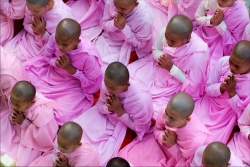Buddhist nun professors or none?
By Michaela Haas
Buddhist women are celebrating a landmark victory:
For the first time in the history of Tibetan Buddhism, 27 nuns have gathered in North India at Jamyang Choling Nunnery near Dharamsala and have begun their exams for the Tibetan equivalent of a Ph.D., the so-called Geshe-title.
To understand the impact and range of this decision, take a moment to imagine what it would be like if until now only men had been allowed to pass their doctorate exams.
As many American students are preparing for their final exams and graduation celebration during these weeks, picture what this would look like if girls were excluded.
This was the situation for women in the Himalayas—and it is about to change!
So, why is this such a big deal and why did it take so long?
After all, in the Western world the first professor degree was awarded to a woman at a European university almost 300 years ago, in 1732.
(Scientist Laura Bassi taught physics at the University of Bologna.)
And more than 2,500 years ago the Buddha himself allowed women into his order and ordained his own foster mother, Mahaprajapati.
She and 500 like-minded women had to shave their heads and walk 350 miles barefoot to show their unwavering determination, before Buddha Shakyamuni finally granted their request—a revolutionary decision in India at the time.
The Buddha’s order was the first in Asia along with the Jains to formally allow women in its ranks.
Yet it may come as a surprise to many that despite its progressive image in the West, the Tibetan Buddhist tradition does not know full ordination for women, and thus women cannot study the entire curriculum.
For complex historical and patriarchal reasons, the ordination lineage did not migrate when Buddhism spread from India to Tibet, thus outclassing the Tibetan Buddhist nuns as inferior.
Tibetan Buddhist nuns have to travel to countries where the Chinese ordination lineage is alive to receive full ordination in a Buddhist lineage that they are not entirely familiar with.
“Most Tibetan nuns don’t have the means to travel to Hong Kong or Korea,” says Jetsun Tenzin Palmo, the most senior Western born Tibetan Buddhist nun alive today, in the new book Dakini Power,
“and even if they did, they want to be ordained in their own tradition, by their own lamas, in their own robes.”
A side-effect of this issue is that the nuns don’t have equal access to the full curriculum – only fully ordained monastics can study ethics in their entirety.
